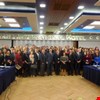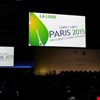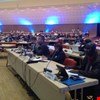

The Integrated Drought Management Project in West Africa (IDMP-WA) made its internal assessment of the first year of project implementation and discussed the existing national plans during a meeting.
The meeting, held in Ouagadougou from 8 to 10 December 2015 was an opportunity to discuss the main actions undertaken during the first year of implementation of the project. Among these actions the review in detail of the initiatives / institutions in Burkina Faso, Niger, Mali and at regional level, starting the establishment of national and regional platforms of exchanges on integrated drought management, the development by CWP and their partners of demonstration project documents, the identification of training needs for stakeholders and also the preliminary exchanges with the ECOWAS/WRCC to advocate for the development of regional guidelines ondrought.


The Inception Meeting of the Global Environment Facility (GEF) supported project “Enabling Transboundary Cooperation and Integrated Water Resources Management in the extended Drin River Basin” took place in Tirana, on 16 December 2015, at the presence of Mr. Edmond Panariti, Minister of Agriculture, Rural Development and Water Administration, Mr. Ferid Agani, Minister of Environment and Spatial Planning, as well as Mr. Stevo Temelkovski, Deputy Minister of Environment and Physical Planning.


The Regional Workshop on South-South Cooperation in Flood Management organised by GWPO and GWP China was held from 14 to 16 December 2015 in Guangdong, China.
The Mékrou Project Manager who took part to the Extraordinary Summit of the Niger Basin Authority (NBA) held in Bamako from 2 to 5 November 2015 as part of the validation of the Project Implementation Committee, to exchange with the executives of the NBA and the various 9 countries delegations, members of the NBA on the modalities for the management of the official ceremony by the Ministers of the NBA.

The 21st session of the Conference of the Parties to the UNFCCC (COP21) adopted a new climate agreement in Paris, France, on 12 December. GWP welcomes the landmark agreement, which was signed by nearly 200 countries, and is committed to support it.

GWP Southeast Asia has produced a video as part of their Water, Climate and Development Programme (WACDEP). It introduces the district of Maesot in west Thailand, where communities are helping each other to deal with flood related problems.

The seventh session of the Meeting of the Parties to the UNECE Convention on the Protection and Use of Transboundary Watercourses and International Lakes took place on 17-21 November 2015 in Budapest, Hungary. GWP was represented with participants from several countries.

The seventh session of the Meeting of the Parties to the UNECE Convention on the Protection and Use of Transboundary Watercourses and International Lakes took place on 17-21 November 2015 in Budapest, Hungary. GWP was represented with participants from several countries.